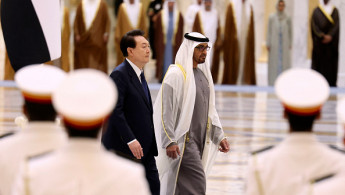South Korean president travels to UAE seeking arms and investments
South Korean President Yoon Suk Yeol received an honour guard welcome in the United Arab Emirates on Sunday, as reports of a $30 billion investment in South Korea's industries by the UAE across arms and energy point to decades of closer economic cooperation.
The investment decision was announced as Yoon Suk-yeol met his UAE counterpart, Sheikh Mohammed bin Zayed al-Nahyan, in Abu Dhabi during a four-day state visit, Yoon's office said.
Yoon's visit comes as South Korea conducts business deals worth billions of dollars and stations special forces troops to defend the UAE, an arrangement that drew criticism under his liberal predecessor.
Now, however, it appears the conservative leader wants to double down on those military links even as tensions with neighbouring Iran have already seen Tehran seize a South Korean oil tanker in 2021.
“I think that the situation in the Middle East is changing very rapidly when it comes to geopolitics,” said June Park, a fellow with the International Strategy Forum at Schmidt Futures. “So Korea wants to make sure some of the strategic partnerships and the components ... with the UAE."
An honour guard of traditionally dressed Emiratis greeted Yoon and his wife, Kim Keon Hee. They twirled model Lee-Enfield rifles alongside troops on camelback and horseback. Inside, a military band played the South Korean and Emirati national anthems.
On Saturday, South Korea's Yonhap news agency quoted an anonymous presidency official as also saying that an arms deal was planned.
"The atmosphere is extremely ripe for security or military cooperation between South Korea and the UAE involving the arms industry,” the official said, according to Yonhap.
South Korea’s biggest project remains the Barakah nuclear power plant, Seoul’s first attempt to build atomic reactors abroad. The $20 billion facility, which ultimately will have four reactors, is in the UAE’s western deserts near the Saudi border and one day will account for nearly a quarter of all of the Emirates’ power needs.
It is also key to the UAE’s plans to go carbon neutral by 2050, a pledge that takes on special importance as it prepares to host the United Nations COP28 climate negotiations beginning in November in Dubai.





 Follow the Middle East's top stories in English at The New Arab on Google News
Follow the Middle East's top stories in English at The New Arab on Google News


